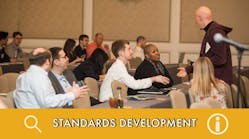Controlled environment agriculture event seeks consensus for industry growth
LEDs Magazine is the premier media partner of the Resilient Harvests Conference, which will take place Nov. 1-2 in Long Beach, Calif. We spoke with Endeavor Business Media VP and publisher Steve Beyer, who at the time of publication led EBM’s Lighting & Cabling Group (he has since switched to the company's Laser & Military Group at EBM). Beyer explained that the disruption to in-person events during the early COVID-19 pandemic led the HortiCann Light + Tech conference management team to reevaluate the target market of the former lighting-centric exhibition and conference program and move toward a broader controlled environment agriculture (CEA) strategy.
As Beyer explained, “We decided to reengineer the shell from HortiCann Light + Tech — which was primarily attracting suppliers of lighting products on the exhibition side — to a much broader group of suppliers who are all involved in different types of indoor agriculture products and technologies…. The market for CEA is just so expansive, so we decided we needed to expand our focus in partnerships as well.”
As a result, EBM sought a conference developer with insight into the appropriate content that could engage attendees on three fronts: policy, programs, and practices. Such a relationship was established with Portland, Ore.-based CEA consultancy firm Resource Innovation Institute, which provides benchmarking and other services to CEA industry stakeholders, including workforce and CEA best-practices development for energy efficiency, decarbonization, and water circularity.
“RII collaborates with other industry organizations and multidisciplinary groups that we have established for the purposes of researching market needs, determining key performance indicators, and setting up baselines for achieving environmental excellence in CEA facilities,” said RII executive director Derek Smith, who serves as Resilient Harvests Conference program director. “For example, our team has partnered with the U.S. Department of Agriculture and ACEEE [American Council for an Energy Efficient Economy] to help develop a market transformation strategy for the CEA industry.”
Funding from the USDA’s Natural Resource Conservation Service has driven efforts to deliver a resource-efficiency benchmarking program that is spawning educational guides, training programs, and initiatives that better engage policymakers, CEA producers, and services/equipment providers in cooperating to further market growth, develop standardized processes, and optimize facility efficiency while improving crop yields and quality.
“This funded project in which RII has participated led us to realize that we could leverage that knowledge we’ve aggregated, alongside the right partner to handle the logistics and business approach, to build an event program that would benefit all stakeholders in CEA,” Smith said.
Read on to learn more about the Resilient Harvests Conference structure and program highlights.
Editor’s note: Program sessions and speakers are subject to change at the discretion of event management. This is not a complete summary of all conference presentations and activities.
Seeking CEA efficiency
Natural and energy resources are at a critical tipping point, Beyer noted, and regulation has restricted the maximum usage in regions such as California.
The Resilient Harvests Conference will open with a data-driven discussion featuring information gathered via the USDA project. RII operations manager Carmen Azzaretti will moderate the conversation with project stakeholders, evaluating energy and water usage across varying climates and crops; comparing indoor/greenhouse farming to other sectors’ resource consumption; and analyzing which technologies and practices resulted in greater resource efficiency.
Another panel will address the implications of net zero objectives, and how renewable energy sources, microgrids, and other energy sources will empower CEA operators to equip facilities with closed-loop systems design, assisting in resource recapture and thereby reducing greenhouse gas emissions generated by CEA facilities. Moderator David Van Holde of the U.S. Department of Energy CHP Technical Assistance Partnership will lead panelists in an exploration of the various energy options and the benefits of distributed resources on indoor farming operations. Additional talks will bring a regional focus to policy development and how CEA producers can leverage local regulations to develop the highest-performing grow facilities.
Keynote highlights
On Nov. 1, keynote speaker Chieri Kubota, a professor at The Ohio State University’s Ohio Controlled Environment Agriculture Center, will bring a scientist’s eye to the controllable aspects of indoor farming and how they can be tailored to regional needs. As a child who grew up in Tokyo, Kubota has said, she was far removed from the agricultural sector but during college was intrigued by the possibilities of indoor cultivation enabled by research and technology.
On Nov. 2, California Energy Commissioner Andrew McAllister will share agency activities in rolling out strong clean-energy policy helping to shape the future of California environmental, sustainability, and efficiency regulations through statewide programs. McAllister leads the CEC’s charge to establish a global starting point for CEA energy guidance with the addition of California’s Title 24, Part 6, Energy Code for Controlled Environment Horticulture in January 2023. (Read more about how to optimize horticultural facilities to meet Title 24 requirements.)
Also on the second day of the conference, Shanita Penny, founder and CEO of consultancy Budding Solutions, will draw from her experience and perspectives on cannabis advocacy and social activism to explain ways to position businesses to grow by engaging local economies with cultivators. Penny recently joined Washington, D.C. firm Forbes Tate Partners as a senior vice president of public affairs, counseling clients and partners on the evolving cannabis market sector. She continues to advocate for equitable U.S. cannabis regulations that support responsible consumption, clinical and scientific research, and access to capital that will fuel industry growth.
Programs and practices
At the Resilient Harvests Conference, the CEA sector will also cover practical design for high-tech indoor grow operations with energy and indoor-climate concerns that can resemble those of large production facilities and even data centers in some respects. Producers will need to identify strategies to handle energy loads, manage control systems, and analyze the economics of large-scale production to secure long-term profitability, expand the workforce, achieve food security, and meet climate-impact targets.
Day 2 speakers will lay out a roadmap for future greenhouse and indoor farming facility design and systems integration; explore public-private partnerships that achieve economic and environmental objectives; and explain energy management services, utility rate structuring, and collaboration models for CEA producers and utilities.
The second day will also host the exciting TechTalk Community Breakout series. RII staff, technical advisors, and member organizations will deliver short presentations in focused groups. TechTalk participants will include subject-matter experts in materials, construction/engineering, automation, water treatment, environmental controls, U.S. regulatory bodies, and more. Attendees will have the opportunity to engage with these smaller breakout groups with time for Q&A. Talks will center around best practices in the following areas:
- Lighting – How to specify the right lighting for the facility and cultivars
- HVAC – How to ensure proper HVAC conditions to maintain the entire technology ecosystem
- Facility design and construction – Key design questions when planning a new facility or retrofit
- Water circularity – Innovations in reuse and recycling to minimize water waste
- Automation and controls – Information collection, analysis, and data-driven operations management
- Utility and efficiency programs – Tips for facilitating and utilizing efficiency programs
- Policy, codes, and industry standards – How regulators and policymakers develop codes, ordinances, and more to address the needs of the farm economy while conserving resources
This is just an overview of the compelling speakers and sessions preparing to empower the CEA market with practical intelligence and innovative ideas for long-term growth. Register for the Resilient Harvests Conference and gain firsthand access to these subject-matter experts and networking opportunities on the exhibit floor.
CARRIE MEADOWS is managing editor of LEDs Magazine, with 20 years’ experience in business-to-business publishing across technology markets including solid-state technology manufacturing, fiberoptic communications, machine vision, lasers and photonics, and LEDs and lighting.
For up-to-the-minute LED and SSL updates, follow us on Twitter. You’ll find curated content and commentary, as well as information on industry events, webcasts, and surveys on our LinkedIn page and our Facebook page.

Carrie Meadows | Editor-in-Chief, LEDs Magazine
Carrie Meadows has more than 20 years of experience in the publishing and media industry. She worked with the PennWell Technology Group for more than 17 years, having been part of the editorial staff at Solid State Technology, Microlithography World, Lightwave, Portable Design, CleanRooms, Laser Focus World, and Vision Systems Design before the group was acquired by current parent company Endeavor Business Media.
Meadows has received finalist recognition for LEDs Magazine in the FOLIO Eddie Awards, and has volunteered as a judge on several B2B editorial awards committees. She received a BA in English literature from Saint Anselm College, and earned thesis honors in the college's Geisel Library. Without the patience to sit down and write a book of her own, she has gladly undertaken the role of editor for the writings of friends and family.
Meadows enjoys living in the beautiful but sometimes unpredictable four seasons of the New England region, volunteering with an animal shelter, reading (of course), and walking with friends and extended "dog family" in her spare time.







